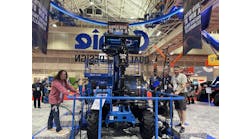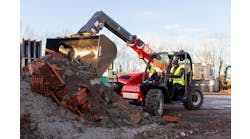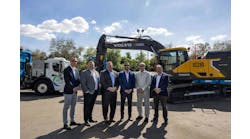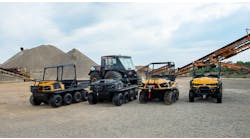Göteborg, Sweden-based Volvo last week celebrated its 80th anniversary. On April 14, 1927, the company’s first car, the Volvo ÖV4, rolled off the production line at the plant in Hisingen, Göteborg. Today, the company is both a global manufacturer of commercial vehicles, construction equipment and cars.
After the first passenger car in 1927 and the first truck in 1928, Volvo followed with a bus, the ’B1’, which it presented in 1934.
Later in the 1930’s Volvo acquired the Penta plant in Skövde, Sweden. With Penta, Volvo gained control of both development, production and quality control of engines for all its products.
Volvo continued to make strategic acquisitions during the 1940’s. When it acquired Svenska Flygmotor (now known as Volvo Aero) in Trollhättan, north of Gothenburg, in 1941, Volvo gained access not only to a completely new range of products, but also to high technology competence that would be of great benefit to the other companies in the growing Volvo Group.
In 1950, it acquired Bolinder–Munktell (a company that dated back to 1832), an investment that would give a good return and would turn Volvo into the “engine” of modernization of Swedish agriculture.
Volvo/Bolinder–Munktell presented its first construction vehicle in 1954. The truck known as Titan and the L420 Snabbe (with a Volvo-designed front-driven steel cab and V8 engine), along with the mid-engine bus B655 strengthened Volvo’s dominance in the commercial vehicle segment.
During the final years of the 1950’s, Volvo Penta presented the direct injection diesel engine, the MD1, and the revolutionary Acquamatic, which brought Volvo to the forefront of the marine engine industry.
In 1965, a truck and car assembly plant was opened in Gent, Belgium. Volvo continued its global expansion opening a new passenger car factory in Kuala Lumpur, Malaysia in 1968.
Production capacity in Sweden also increased. In 1963-64, a new factory was opened in Gothenburg, in an area called Torslanda on the island of Hisingen. In the new factory, production of passenger cars and commercial vehicles was completely separate.
In the 1980s Volvo acquired U.S. truck manufacturer, White Motor Corp., which brought great progress in North America, South America, Asia and Australia, the company said.
Volvo also strengthened its position as a leading manufacturer of construction equipment in the 80s when it joined forces with an American company to build Volvo Michigan Euclid. Today the company is known as Volvo Construction Equipment and is an international provider of construction equipment with a broad range of products and dealers.
By the end of the 1990’s, Volvo had established a strong foothold in Asia. Volvo trucks, buses and construction equipment were being assembled in India, Thailand, Malaysia and Saudi Arabia, among other locations.
During the early years of the third millennium, Volvo Group has strengthened its position as a world-leading manufacturer of commercial vehicles, construction equipment, marine and industrial engines, and services and products for the aerospace industry.
Volvo Construction Equipment’s development into a more global and complete manufacturer started during the 1990s and has continued into the current decade. The company is now the world’s third-largest manufacturer of construction equipment. At the beginning of 2007, Volvo acquired Ingersoll Rand’s division for highway construction equipment and Lingong, a Chinese manufacturer of wheel loaders. The latter transaction made Volvo CE the world’s largest manufacturer of wheel loaders.
A few months later, the Volvo Group completed a strategically important transaction in Asia — the acquisition of the Japanese truck maker Nissan Diesel. This gave the Volvo Group a presence in Asia similar to that developed in North America and Europe.
In the engine area, the 21st century has entailed a comprehensive shift. A total of 18 engine families have become two, and the Volvo Group is now the world’s largest manufacturer of heavy diesel engines, offering the world’s most modern engine program. The new family of heavy engines satisfies all of the known emission requirements that will gradually become effective up to 2014.
As a result of the high growth rate, the Volvo Group has become Sweden’s largest company by far, with nearly 100,000 employees worldwide and sales of nearly SEK 300 billion (about U.S. $436.1 billion).





